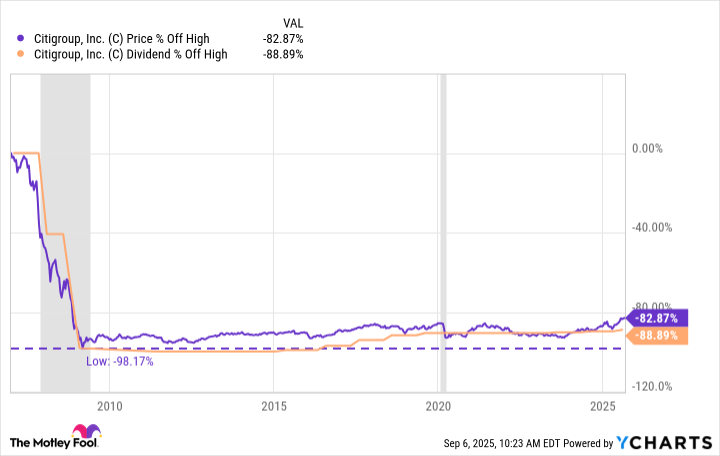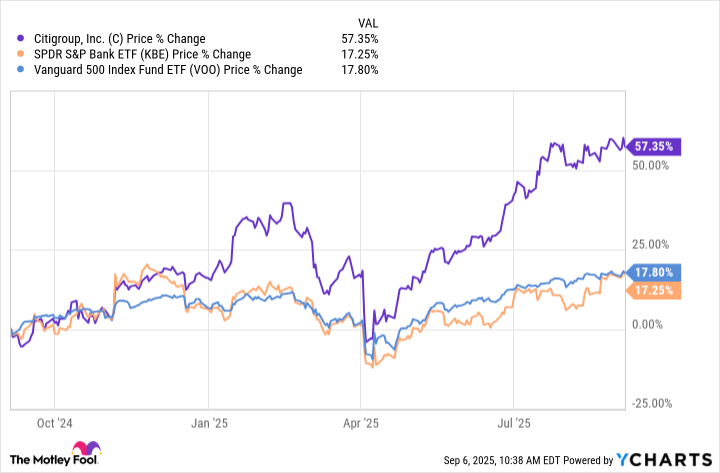Citigroup (C +1.01%) is a household name in banking. Its business goes well beyond the local bank branch on the street corner. But is this diversified industry giant worth buying today or should investors tread with a little caution? There are important history and valuation issues to consider.

Image source: Getty Images.
Citigroup's graph is terrible when you go back far enough
Although Citigroup is an iconic bank that has been around for a long time, its history contains some rough patches. The most recent trouble spot came up during the deep recession between 2007 and 2009, which has been dubbed the Great Recession. During that financially led global crisis, Citigroup's stock collapsed by 98%!
What happened was Citigroup got caught up in the subprime mortgage debacle that upended the financial industry. There were legitimate concerns that the global financial system would collapse. Citigroup ended up taking a government bailout and eliminated its dividend.
Citigroup's dividend, when it was reinstated in 2011, was stuck at a penny until 2015 and it still isn't back to where it was before the elimination. The bank's stock price hasn't fully recovered, either. To be fair, Citigroup has made material changes to its business and is in much stronger financial shape today than it was during and right after the Great Recession. However, it is also important to remember that the bank, like many others, has a history of getting caught up with Wall Street's emotional roller coaster.
Where is Citigroup today?
As a business, Citigroup is doing reasonably well right now. In the second quarter of 2025, the company's revenue rose 9% year over year, excluding one-time items. Earnings per share came in at $1.96, up from $1.52 in the same period of 2024. Return on common equity, a measure of how well the business is performing, jumped to 7.7% in the second quarter of 2025 from 6.3% a year earlier. And the bank's Tier 1 capital ratio, a measure of its ability to weather financial hardship, was a strong 13.5%.

NYSE: C
Key Data Points
There was a lot to like in the quarter. But there's just one small problem -- investors are well aware of the company's improved results. During the past 12 months, the stock has risen almost 60% while other large banks have, on average, only risen about 17% or so. For reference, the S&P 500 index (^GSPC +0.54%) has also risen about 18% during that span. Which means that Citigroup is trouncing both the market and its peers.
And most of that outperformance has taken shape since roughly the end of the first quarter. So it appears that Wall Street has taken a liking to Citigroup in a big way. At this point the bank's price-to-sales, price-to-earnings, and price-to-book value ratios are all above their five-year averages. The stock's 2.5% dividend yield, meanwhile, is sightly higher than the peer average of around 2.3%, hinting that even if there is more upside, it isn't particularly large.
Taken as a whole, it looks like investors buying Citigroup today are paying up for the privilege. That doesn't mean that Citigroup is a bad company, just that investors may have become a little too exuberant about its prospects given the swift stock price increase of the past few months.
Investors might want to watch from the sidelines
Citigroup may, again, be caught up in the emotional swings that are so common on Wall Street. Although the business itself seems to be on solid footing this time around, the price that investors are affording the shares might be a bit stretched. More conservative investors will probably be better off putting this bank on the wish list than adding it to the buy list right now.








